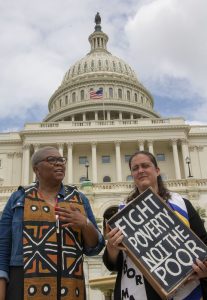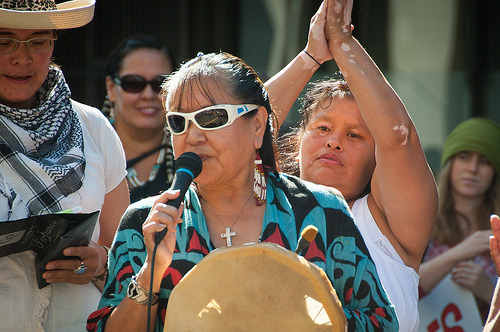Revised Common Lectionary Reflection, Fifth Sunday after the Epiphany, Year A
February 9, 2020
Lessons: Isaiah 58:1-9a (9b-12); Psalm 122:1-9 (10), 1 Corinthians 2:1-12 (13-16), Matthew 5:13-20
Theme: God’s faithful and generous people know that discipleship is much more than window dressing; it’s a 24/7/365 proposition, with God at the helm.
Key Scripture: Is this not the fast that I choose: to lose the bonds of injustice, to undo the thongs of the yoke, to let the oppressed go free, and to break every yoke? Is it not to share your bread with the hungry, and bring the homeless poor into your house; when you see the naked, to cover them, and not to hide yourself from your own kin. — Isaiah 58:6-7
 We have a choice to make this week, dear colleagues in ministry. Will we preach these lessons in a way that honors them and the truth they bear, or will we soften and sugarcoat to keep feathers from flying between the pews? It’s not an easy task. I know; I’ve been there with parishioners all over the map politically, economically, socially. I’ve heard the comments: “We come to church for comfort, Pastor. Can’t you lighten up a bit?” or “Don’t ever let me hear politics from the pulpit, preacher. That’s not your job.” or “We hear enough about all the rotten stuff in the world the rest of the week. Just tell us about Jesus, okay?”
We have a choice to make this week, dear colleagues in ministry. Will we preach these lessons in a way that honors them and the truth they bear, or will we soften and sugarcoat to keep feathers from flying between the pews? It’s not an easy task. I know; I’ve been there with parishioners all over the map politically, economically, socially. I’ve heard the comments: “We come to church for comfort, Pastor. Can’t you lighten up a bit?” or “Don’t ever let me hear politics from the pulpit, preacher. That’s not your job.” or “We hear enough about all the rotten stuff in the world the rest of the week. Just tell us about Jesus, okay?”
Okay. If you’re like me, you’ve done your best to respond in love to these and other comments: “Yes! Let me tell you about Jesus and open your ears to hear some hard words and a big helping of love and grace.” Or, “I get that you hear painful and distressing stuff on the news and through your social media channels, but check out what scripture says in response to the woes of the world.” Or, “You won’t hear me preaching politics, but you will hear me proclaiming God’s message to a broken and beloved world.” Or, “Yes, we all want comfort and to feel safe in the grip of Jesus’ grace. Nothing at all wrong with that, but Jesus also makes clear the cost of discipleship. We need to be honest about that, too.”
So it seems, dear preachers and teachers, that we spend a fair amount of time measuring our words, checking our prejudices and reactions, and praying for wisdom and guidance in the very real world work of ministry and parish life. It’s a balancing act between the pastoral and prophetic, between law and gospel, and between promise and responsibility. You probably deal with some level of cognitive dissonance between your passion for the gospel and the real world paycheck and benefits that your congregation controls. It’s a tough walk, and I give thanks to you for being willing to navigate the call in the midst of tremendous upheaval in the religious landscape and polarizing politics with a heavy side of nationalism. It is not an easy call. I remain convinced, however, that when we lean into the Spirit’s nudgings and guidance we will find the wherewithal and courage to preach and teach in truth and love. With God, nothing is impossible.
Perhaps you will want to make a connection between our own world and that of the early Christian diaspora and the era of the Babylonian exile. God’s words to God’s people recorded in Isaiah are equally timely today, as are Jesus’ words about being salt and light. So much has changed, but the truth and wisdom of scripture does not change. It is timeless and capable of informing—and infusing—our own time and contexts with needed change and reorientation.
Whether you choose to emphasize the “fast” the God desires in Isaiah 58, or Paul’s admonishments about spiritual discernment and having the mind of Christ, or Jesus’ teachings about salt, light, and righteousness, you have an opportunity to begin (or perhaps continue) the hard holy work of bridging divides, repairing the breach, and inviting God’s beloved people into the work of restoring the kindom. If our communities of  faith cannot be safe space for people to be who they are created to be, and holy space where all are heard and valued (not necessarily agreed with, but valued), and where God’s love, mercy, and grace flow as freely as a river, then why are we even showing up? Perhaps you might invite worshipers to ponder what they appreciate about your faith community and what might be needed to make it holy and safe space for everyone. Who would not feel comfortable in the midst of your worshiping community? Why? What needs to change?
faith cannot be safe space for people to be who they are created to be, and holy space where all are heard and valued (not necessarily agreed with, but valued), and where God’s love, mercy, and grace flow as freely as a river, then why are we even showing up? Perhaps you might invite worshipers to ponder what they appreciate about your faith community and what might be needed to make it holy and safe space for everyone. Who would not feel comfortable in the midst of your worshiping community? Why? What needs to change?
Pray for the wisdom, pray for the words, and pray for the will to speak boldly and truthfully in a spirit of love and unity. Trust that God is with you and that as long as you are connected to your divine power source, you have all that you need. After all, you too, are God’s beloved and are deeply cherished. Blessings on your faithful teaching and proclamation and on your stewardship of all that has been entrusted to you, especially the gospel of the living Christ!
In Worship
Consider hymnody that amplifies the themes of justice, living in Christ, and being salt and light for the world. Some hymns you might explore include “How Clear is our Vocation, Lord,” “God, When Human Bonds are Broken,” “We are all One in Christ,” “Rise, Shine, You People!,” “Build Us Up, Lord,” “Signs and Wonders,” “Let Justice Flow Like Streams,” “We are Called,” and/or “This Little Light of Mine.”
Invite people to contemplate whether your faith community is truly welcoming and safe space. Would they feel comfortable sharing their feelings about any number of subjects, their fears, their dreams, and their hopes? If so, what it is about the community that makes it safe space? If not, why not? What might need to change?
Digging Deeper: Consider working with the Civil Conversations Project in your context. Click here to learn more. After training facilitators, host a “People’s Dinner Church.” Use scripture as the basis for discussing difficult topics, and end with communion. You might also wish to host a community listening post. Invite local elected officials, business leaders, first respondors, and as many residents as you can gather. Make sure to show radical hospitality. This is not about promoting your congregation but rather encouraging your congregation to be deeply engaged with and listening to the community. After the event, plan and promote a brainstorming and information session to share the results of the event and to plan paths forward to more community engagement and response to identified needs.
With Youth
This week consider one or more contemporary activists who are using a prophetic voice to speak truth to power. A few suggestions follow, with links for more information, and a quote to ponder in light of this week’s lessons. Questions you might consider include: Why do you suppose people are willing to listen to this person or these people? What is the role of their faith or spirituality in their work and witness? What do you admire about this person/these people? What about their work do you question? How might you speak truth to power in a way that is consistent to your faith at this stage of your life?
- Leonard Peltier
Click here to learn more about American Indian activist Leonard Peltier (of the Anishinabe, Dakota, and Lakota Nations). Peltier’s story is controversial and complicated, with many folks believing he is not guilty of the murder charges leveled against him. He continues to work for the good of his people and the earth while incarcerated.
“What you believe and what you do are the same thing. In Indian way, if you see your people suffering, helping them becomes absolutely necessary. It’s not a social act of charity or welfare assistance, it’s a spiritual act, a holy deed.”
–Leonard Peltier, Prison Writings: My Life is My Sun Dance, p. 103
- The Rev. Dr. William Barber and The Rev. Dr. Liz Theoharis
Pastors Barber and Theoharis are leaders in The Poor People’s Campaign. Click here to learn about the Poor People’s Campaign. Click here to learn about Kairos: The Center for Religions, Rights, & Social Justice.
“There is no religious left and religious right… There is only a moral center. And the scripture is very clear about where you have to be to be in the moral center – you have to be on the side of the poor, the working, the sick, the immigrant.” – Rev. Dr. William J. Barber II
“When Jesus says, ‘the poor will always be with you’ he is actually quoting Deuteronomy 15, which says that there will be no poor person among you if you follow God’s commandments — to forgive debts, release slaves, pay people fairly and lend money even knowing you won’t get paid back. Deuteronomy 15 continues that because people will not follow those commandments, the poor will never cease to be in the land.
“Thus, in this passage and throughout the Bible, Jesus isn’t condoning poverty — he is reminding us that God hates poverty, and has commanded us to end poverty by forgiving debts, raising wages, outlawing slavery, and restructuring society around the needs of the poor. He is reminding the disciples that charity and hypocrisy will not end poverty but keep poverty with us always. He is reminding his followers that he is going to be killed for bringing God’s reign here on earth, and it is their responsibility to continue the quest for justice.
“This is our charge. Jesus came to bring good news to the poor. Will we?” — Rev. Dr. Liz Theoharis
- Allyson McKinney Timm, Esq.
McKinney Timm is an elder in the Presbyterian Church (U.S.A.) and a theologically trained human rights attorney. Her commitment to justice ministry inspired McKinney Timm to establish Justice Revival, a nonprofit organization working with Christian communities to respond faithfully to the biblical call to justice by standing in solidarity with the oppressed and defending the human rights of all. Click here to learn more.
“People experiencing homelessness deserve respect. We help victims of natural disasters without questioning merit or worthiness; homelessness is just as dire.
“Empathizing means putting ourselves in the other’s shoes, and imagining how we would feel. Let’s protect the human dignity of our homeless friends and neighbors by affirming their belonging in the Beloved Community that we all hope to build.” — Allyson McKinney Timm, Esq.
With Children
This week’s focus verses are Isaiah 58:6-7 — Is this not the fast that I choose: to lose the bonds of injustice, to undo the thongs of the yoke, to let the oppressed go free, and to break every yoke? Is it not to share your bread with the hungry, and bring the homeless poor into your house; when you see the naked, to cover them, and not to hide yourself from your own kin.
When you think of fasting, what comes to mind? (Entertain all answers) When I think about fasting, I think of going without food—kind of like Jesus did in the desert for 40 days, but not for that long. I get hungry just missing one or two meals. Evidently, God is telling the people that God doesn’t want them to fast in a public way while not doing right in private. God responds to the people saying “Look, you serve your own interest on your fast day, and oppress all your workers.” and “Look, you fast only to quarrel and to fight and to strike with a wicked fist.”
Sounds like God isn’t asking us to fast by abstaining from food or by acting holy on Sunday and horrible on Monday. The fast God wants involves action. God wants us to loose the bonds of injustice, to remove undue and heavy burdens that keep people down, to let the oppressed go free, and to break down walls and barriers. God wants us to share our food with those who are hungry, to bring homeless poor into our homes and community spaces, and to share our clothes, and to be in good relationship with our family and friends. God also wants us to stop fussing and fighting, to stop speaking evil and pointing the finger at others, and to raise up those who suffer.
That sounds like a lot of work to me! How about you? Do these sound like good things—a fast worth keeping? I think so. God also offers a promise. If we work on doing these things and living like this, God will guide us, satisfy our needs and make us strong, and we get to be called “the repairer of the breach, the restorer of streets to live in.” How cool is that? We get to work with God, and it will be good. Sure, it may be difficult sometimes, and we may encounter resistance, but we have the power of the Holy Spirit with us. Remember, it’s not so much what you say or how pious you look, it’s what you do and how you love God and neighbor that really matter. Let’s say a prayer together.
Dear God (Dear God),
Thank you for loving us (thank you for loving us) and calling us to help you (and calling us to help you) make this world a better place (make this world a better place) for all God’s people (for all God’s people). In Jesus’ name (In Jesus’ name) Amen. (Amen.)
Weekly Stewardship Bulletin Insert
We are stewards of good news, and we are also stewards of the truth. That means that sometimes we have to speak the truth in love in accordance with our faith and understanding of what God desires from us. The Good news is that God promises to be with us always, even when the going gets tough.
Stewardship at Home
How do you and members of your family or circle of loved ones speak the truth in love and stand up for what you believe to be true and right? Do you find this difficult work? Does it make you afraid or uncertain? What do you really believe in enough to take public action? Have you done so before? Might you be willing to do more in the future?
Consider some of the modern day activists listed in the “With Youth” section. Are you familiar with the work of these people? If not, spend some time learning about what they do and how they became interested in speaking out and working for a greater cause. Perhaps you can think of other faith activists such as Dietrich Bonhoeffer, Dorothy Day, Shane Claiborne, or the late Rachel Held Evans. If you have young people in your family or circle, you might wish to talk about some of the young climate activists, many of whom are people of color. Click here for more information.
Pray about how God might be calling you to speak the truth in love, both to power and to neighbor and friend. You might check out your denomination’s social justice department or team and see what opportunities exist. Commit to making one action or having one civil conversation with someone you trust about a topic on which the two of you disagree. Pray for God to guide you and give you words and wisdom—and a keen listening ear.
2017 Reflection: https://www.stewardshipoflife.org/2017/02/salt-light-and-the-fast-god-chooses/
2014 Reflection: https://www.stewardshipoflife.org/2014/02/fasting-gods-way/
2011 Reflection: https://www.stewardshipoflife.org/2011/02/salty-saints/
Images: Cailie Frampton; Becker1999; and Fabrice Florin, Creative Commons usage license. Thanks!
Note: Reprint rights granted to congregations and other church organizations for local, nonprofit use. Just include this note: “Copyright (c) 2020, Rev. Sharron Blezard. Used by Permission.” Other uses, please inquire: thewritelife@hotmail.com.




Leave a Reply